
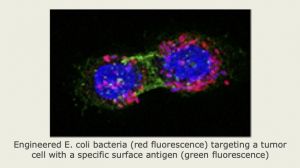

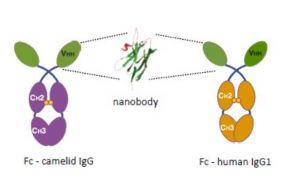
CSIC and the University of Las Palmas de Gran Canaria have developed a panel of high affinity nanobodies (Nb) binding to diverse SARS-CoV-2 RBD epitopes of spike protein, and a set of nanobody- derived neutralizing heavy chain antibodies (hcAbs) with therapeutic potential in vivo, as they can protect hACE2-transgenic mice after infection with a lethal dose of SARS-CoV-2.
Industrial partners from biotech pharmaceutical industry are being sought to collaborate through a patent licence or co-development agreement
An offer for Patent Licensing or co-development
More information here
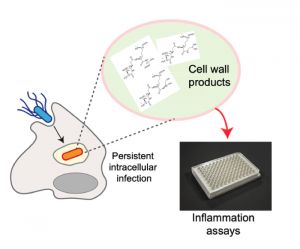
CSIC and Universidad Autónoma de Madrid (UAM) have characterized new structures in the peptidoglycan of pathogenic bacteria like Salmonella isolated from the intracellular niche of mammalian cells. Some of the structural differences that have been characterized attain for modifications in the D Ala residue of stem peptides that affect their inflammatory potential.
Industrial partners from the ophthalmic or pharmaceutical industry are being sought to collaborate through a patent licence agreement.
An offer for Patent Licensing
More information here
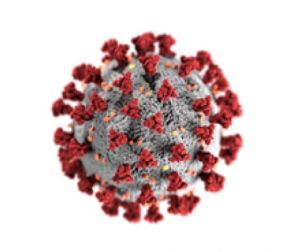
CSIC have found that coated iron oxide (IONPs) and iron oxyhydroxide nanoparticles (IOHNPs) can be used in the treatment and prevention of viral infections caused by Coronaviridae, especially those caused by respiratory syndrome-related coronaviruses selected from the species “Severe acute respiratory syndrome-related coronavirus” (such as SARS-CoV and SARS-CoV-2) and “Middle East respiratory syndrome-related coronavirus” (MERS-CoV). These coated nanoparticles can provide protection against coronaviruses and represent a new treatment for COVID-19 disease.
Industrial partners from the pharmaceutical industry are being sought to collaborate through a patent licence agreement.
More information here
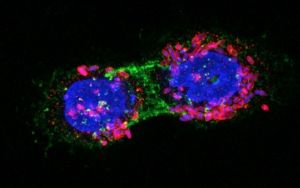
CSIC has developed ENGAGE, engineered bacteria with cell adhesion specificity and programmed delivery of therapeutic proteins into the cytoplasm of target mammalian cells
Industrial partners from the ophthalmic or pharmaceutical industry are being sought to collaborate through a patent licence agreement.
More information here
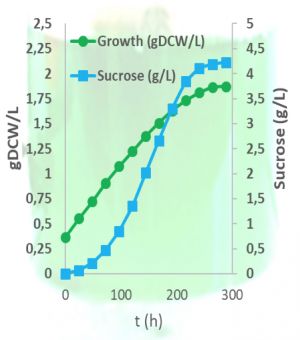
CSIC has developed a procedure for capturing atmospheric CO2 into sugars by constructing and using a recombinant Synechococcus elongatus strain. The novel strain is able to overproduce sucrose coupled to growth in the absent of any environmental stress. Furthermore, the strain is able to maintain a very high sucrose production rate for a long time while exceeding titers previous reported by engineered cyanobacteria. The organic sugar produced can be further used for feeding any biotechnological process in the context of autotrophic/heterotrophic microbial consortia.
Industrial partners are being sought to collaborate through a patent licence agreement.
More information here
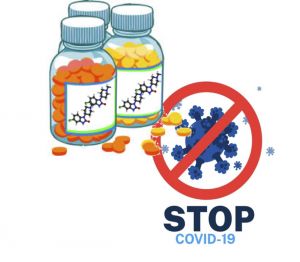
CSIC has discovered a new use for an existing drug on the market as antiviral agent
A new use for a drug already on the market: the prevention or/and treatment of COVID-19
These days there is a need for safe and effective antiviral agents with a wide spectrum of anti-viral activity. Since the emergence of a novel coronavirus (SARS-CoV-2) from Wuhan, China, in December 2019, that has caused millions of cases of human infections and huge cases of deaths globally and was declared as a pandemic by World Health Organisation, broad-spectrum antivirals for the treatment of emerging and endemic CoVs are needed. The virus spreads rapidly from the transmission among human, and the symptoms caused by the virus (abbreviated “COVID-19”) ranges from mild cough and fever to severe pneumonia and potentially life-threatening symptoms. Waiting for the availability of new vaccines, this global emergency has triggered the search for safe and effective pharmacological approaches for eradicating the virus, or at least reducing its effects and hindering the contagion, since, currently there is only one approved therapy to treat SARS-CoV-2 infection. By using a computational approach, the library of FDA approved drugs, already used in humans, has been screened to identify in a quick and efficient way potential antiviral agents against SARS-CoV-2 to be subsequently studied in the corresponding biological studies. In this way, a promising candidate has been found.
More information here
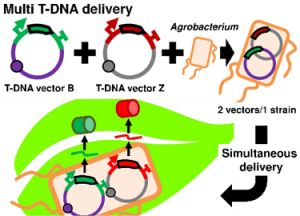
Researchers at the CNB and the Polytechnical University of Valencia have jointly developed an expression vector system that provides a flexible framework for plant biotechnology and synthetic biology applications. The system includes novel mini binary vectors with compatible origins. Vectors have been used successfully in plant transient and stable expressions, CRISPR/Cas9-targeted genome mutagenesis, and for genetic circuit component and viral expression vector delivery.
More information here
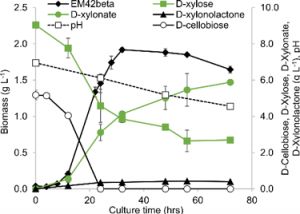
Dr Victor de Lorenzo’s group is developing KT2440 strains of robust stress-resistant and safe (GRAS certified) Pseudomonas putida that are able to utilise plant biomass-derived sugars – glucose, cellobiose, and xylose – and convert them into valuable bioplastics, polyhydroxyalkanoates (PHA) and the platform chemical xylonate. Xylonate can be used as a complexing agent, chelator, or a precursor for co-polyamides, polyesters, hydrogels, 1,2,4-butanetriol, ethylene glycol or glycolate, and may also provide a cheap, non-food derived alternative for D-gluconic acid, which is widely used (about 80 kton/ year) in industry.
More information here
COOKIES POLICY
A cookie is a text file that is stored on your computer or mobile device via a web server and only that server will be able to retrieve or read the contents of the cookie and allow the Web site remember browser preferences and navigate efficiently. Cookies make the interaction between the user and the website faster and easier.
General information
This Website uses cookies. Cookies are small text files generated by the web pages you visit, which contain the session data that can be useful later in the website. In this way this Web remembers information about your visit, which can facilitate your next visit and make the website more useful.
How do cookies?
Cookies can only store text, usually always anonymous and encrypted. No personal information is ever stored in a cookie, or can be associated with identified or identifiable person.
The data allow this website to keep your information between the pages, and also to discuss how to interact with the website. Cookies are safe because they can only store information that is put there by the browser, which is information the user entered in the browser or included in the page request. You can not run the code and can not be used to access your computer. If a website encrypts cookie data, only the website can read the information.
What types of cookies used?
The cookies used by this website can be distinguished by the following criteria:
1. Types of cookies as the entity that manages:
Depending on who the entity operating the computer or domain where cookies are sent and treat the data obtained, we can distinguish:
- Own cookies: are those that are sent to the user's terminal equipment from a computer or domain managed by the editor itself and from which provides the service requested by the user.
- Third party cookies: these are those that are sent to the user's terminal equipment from a machine or domain that is not managed by the publisher, but by another entity data is obtained through cookies.
In the event that the cookies are installed from a computer or domain managed by the editor itself but the information collected by these is managed by a third party can not be considered as party cookies.
2. Types of cookies as the length of time that remain active:
Depending on the length of time that remain active in the terminal equipment can be distinguished:
- Session cookies: cookies are a type designed to collect and store data while the user accesses a web page. Are usually used to store information that only worth preserving for the service requested by the user at any one time (eg a list of products purchased).
- Persistent cookies: cookies are a type of data which are stored in the terminal and can be accessed and treated for a period defined by the head of the cookie, and can range from a few minutes to several years.
3. Cookies types according to their purpose:
Depending on the purpose for which the data are processed through cookies, we can distinguish between:
- Technical cookies: these are those that allow the user to navigate through a web page or application platform and the use of different options or services it exist as, for example, control traffic and data communication, identify the session, access to restricted access parts, remember the elements of an order, make the buying process an order, make an application for registration or participation in an event, use security features while browsing store content for dissemination videos or sound or share content via social networks.
- Customization cookies: these are those that allow the user to access the service with some general characteristics based on a predefined set of criteria in the user terminal would eg language, the type of browser through which you access the service, the locale from which you access the service, etc.
- Analysis cookies: they are those that allow the responsible for them, monitoring and analyzing the behavior of users of the web sites that are linked. The information gathered through such cookies are used in measuring the activity of web sites, application or platform and for the profiling of user navigation of such sites, applications and platforms, in order to make improvements function data analysis how users use the service.
Management tool cookies
This Website uses Google Analytics.
Google Analytics is a free tool from Google that primarily allows website owners know how users interact with your website. Also, enable cookies in the domain of the site in which you are and uses a set of cookies called "__utma" and "__utmz" to collect information anonymously and reporting of website trends without identifying individual users..
For statistics of use of this website use cookies in order to know the level of recurrence of our visitors and more interesting content. This way we can concentrate our efforts on improving the most visited areas and make the user more easily find what they are looking for. On this site you can use the information from your visit for statistical evaluations and calculations anonymous data and to ensure the continuity of service or to make improvements to their websites. For more details, see the link below privacy policy [http://www.google.com/intl/en/policies/privacy/]
How to manage cookies on your computer: disabling and deleting cookies
All Internet browsers allow you to limit the behavior of a cookie or disable cookies within settings or browser settings. The steps for doing so are different for each browser, you can find instructions in the help menu of your browser.
If you decline the use of cookies, since it is possible thanks to the preferences menu of your browser or settings, reject, this website will continue to function properly without the use of the same.
Can you allow, block or delete cookies installed on your computer by setting your browser options installed on your computer:
- For more information about Internet Explorer click here.
- For more information on Chrome click here.
- For more information about Safari click here.
- For more information about Firefox click here.
Through your browser, you can also view the cookies that are on your computer, and delete them as you see fit. Cookies are text files, you can open and read the contents. The data within them is almost always encrypted with a numeric key corresponding to an Internet session so often has no meaning beyond the website who wrote it.
Informed consent
The use of this website on the other hand, implies that you paid your specific consent to the use of cookies, on the terms and conditions provided in this Cookies Policy, without prejudice to the measures of deactivation and removal of cookies that you can take, and mentioned in the previous section.





